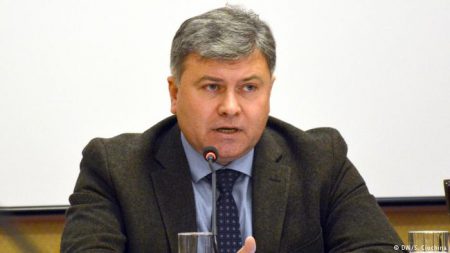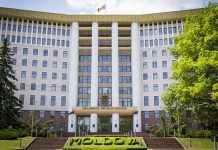On 29 November 2015, Transnistrian separatist region held its ordinary parliamentarian elections. The elections are considered unconstitutional by the Moldovan authorities and, therefore, are not recognized by the Republic of Moldova and the international community. Even Russia, the main sponsor of the separatist region, does not dare to recognize them officially. Yet, neither Moldova nor its partners can afford ignoring their results, which reflect the political evolution that could have a direct impact on the Transnistrian settlement.
It was largely expected that the recent elections would strengthen the control of the current Transnistrian leader Yevgeny Shevchuk and his administration over the region’s political system, economy and financial resources in the run-up for the next year local “presidential elections”, also considered illegal by the Moldovan authorities. To win the parliamentarian elections, Shevchuk and his team used administrative resources at their disposal and launched an aggressive PR campaign under the slogan “Together with Russia against oligarchs”. Surprisingly for many, Shevchuk and his team suffered a resounding defeat. They managed to win only eight seats out of 43 of the next parliament (Supreme Soviet).
People living in the region have become increasingly disappointed with Shevchuk’s economic and social policies. Above all, they have been dissatisfied with the Transnistrian administration’s decision to pay only 70% of pensions and wages, which was enforced in the spring of 2015 as a result of the shrinking budget revenues. Consequently, they have chosen to support the opposition party Obnovlenie (Renewal) that succeeded to win 32 seats in the newly elected legislative. Obnovlenie is the political arm of the most influential Transnistrian industrial & trade holding “Sheriff”. The holding is the biggest employer in the region, is paying competitive wages to its employees, as well as it is one of the largest tax contributors to the regional budget[1].
The results of the parliamentarian elections do not jeopardize in anyway the Russian interests and influence in Transnistria. Russia remains the main Sheriff in town. It has in the region about 2000 well armed military contingent, including peacekeepers, 20 thousands tones of ammunition, it controls local secret services and it subsidizes heavily the region’s economy and its social system mainly through gas supply that is not paid back to Gazprom since 2008. Instead the collected payments for gas consumption are used by the Transnistrian administration to pay for pensions and social services. Meantime, the region has accumulated an astronomic number of gas debts of 4 billion USD that are considered by the Russian authorities as representing Moldova’s gas arrears. Half of those debts have been accumulated during the last 5 years[2].
Without any doubts, both Shevchuk and Obnovlenie will continue to pledge allegiance to Moscow and coordinate closely their actions with Kremlin, particularly on political dialogue with Moldova. Both camps are staunchest pro-Russian forces, favor Transnistria’s independence and support a strong strategic partnership with Russia and an eventual integration of the region in the Eurasian Union. Moscow follows closely the events in the region, yet, for the time being, it avoids taking sides with one or another political camp. Instead, it prefers to play a check in balance act between them.
Weakened by latest elections, Shevchuk will focus primarily on internal issues and will do everything in his power to regain the Transnistrians’ support for his next reelection as the Leader of Transnistrian region. Constrained by dire economic realities, the current Transnistrian administration and his leader are doomed to become more populist on domestic issues. For instance, soon after the parliamentarian elections Shevchuk instructed the Transnistrian administration to pay all pensions’ and wages’ arrears to the people, despite the fact that budget revenues have contracted by 40,5 million USD[3] only this year and the next regional budget is to have at least 46% deficit[4]. Moreover, Shevchuk could behave less conciliatory in his dialogue with Moldovan authorities and more concerned with taking every opportunity to gain the Russia’s full support for his reelection.
On its turn, Obnovlenie represented by wealthy, ambitious and pragmatic businessmen, are going to increase their pressure on Shevchuk and his administration, which have challenged their economic and social status by threatening to nationalize Sheriff’ assets. Most probably, they will use the control of the legislative to increase their political influence in the region by offsetting the Shevchuk’ policies and above all his ambition to be reelected as the Transnistrian Leader in 2016. Obnovlenie and Sheriff have every chance to be successful in that endeavor. They have constitutional majority in the Soviet Supreme that allows them to impeach and sack Yevgeny Shevchuk from his office, if they would decide to go for it. They also have important economic leverages over Transnistrian administration, a large network of powerful connections in Moscow, as well as the huge financial resources crucial for buying the support of the key social groups.
Against this backdrop, it is almost unconceivable to expect that Shevchuk and his administration will give up to Moldovan authorities’ insistence to start unconditionally the negotiations on the future status of Transnistria in the “5+2” format, which includes Moldova, Transnistrian region, Russia, Ukraine, OSCE and EU and USA as observers. On the contrary, more likely Shevchuk is going to harden his conditions for restarting “5+2” meetings, thus trying to present himself as the unwavering defender of the Transnistria’s independence and its economic interests.
Unfortunately, Moldova itself is not ready to start political negotiations on the future status of Transnistrian region. The recurrent governmental instability impedes Moldovan authorities to focus on the Transnistrian settlement and to put in place a credible and coherent reintegration policy. Only in 2015, Moldova has had two governments with the third one in the making, but with very modest chances to survive for more than few months. It is almost obvious that next spring the Moldovan lawmakers would rather fail to elect the new President of Moldova, which means that the early parliamentarian elections could dominated domestic political agenda on the right bank of Nistru River in 2016. Regrettably, Moldova will not get out of the political turmoil very soon and it will continue to lack real interest, as well as strong political will to engage itself in negotiations on the future status of Transnistrian region.
Despite the small-step policy promoted by the Moldovan authorities since 2011, as well as the regular meetings in the “5+2” format, the compromise space between Chisinau and Tiraspol has dangerously narrowed. The Transnistrian administration promotes without any alternative the idea of normalizing the relations with the Republic of Moldova only by the international recognition of Transnistria as an independent state. This solution, however, is unacceptable to the central authorities in Chisinau, who offer instead a special legal status to the Transnistrian region as an autonomous territorial unit, according to the model of the Gagauz Autonomy, an option that is categorically rejected not only by the current administration in Tiraspol, but, also, regretfully, by our citizens in the region. At the same time, the geopolitical discrepancy between the two banks of the Nistru River continues to deepen. While the Republic of Moldova opts for the political association and economic integration with the EU, the Transnistrian region decided to harmonize its legislation and policies with those of the Russian Federation and to promote its integration into the Eurasian Union.
Meantime, Moldova has failed to become a pole of attraction for the Transnistrian region[5]. Despite intense promotion of the European integration vector on the right bank, the Republic of Moldova has failed to become a credible alternative for the citizens from the Transnistrian region. According to the sociological research conducted in the Transnistrian region in July 2014, the majority of respondents who participated in the focus groups excluded the idea of reintegration of Transnistria into the Republic of Moldova with a special legal status. Instead they prefer, first of all, the recognition of Transnistria’s independence or the incorporation of the region into the Russian Federation.
Moreover, the society of the right bank of the Nistru River (the Republic of Moldova) is not ready for a political compromise with the Transnistrian region[6]. According to the sociological research about the prospects for the Transnistrian conflict settlement carried out in 2014 by CBX AXA Company, about 66% of the population of the right bank of the Nistru River believe that Transnistria must be part of the Republic of Moldova just like other districts of the country and only 15% would support the idea of granting a statute of economic, cultural and administrative autonomy for the Transnistrian region. And there is no reason to believe that the situation has changed for better since then.
The Moldovan political establishment is divided more than ever as regards the Transnistrian settlement. The solution to grant to the Transnistrian region a special legal status as stated in Law No. 173 of the Moldovan Parliament on the basic provisions of the special legal status of the settlements on the left bank (Transnistria) of 22 July 2005, no longer has the unequivocal support of the parliamentary parties. The leader of the Party of Communists of the Republic of Moldova, Vladimir Voronin, the main promoter of this Law, is currently in favour for granting the Transnistrian region the status of a republic within the Republic of Moldova[7] and rejects the formula of an autonomous territorial unit with a special legal status, as provided in Art. 3 of the Law No. 173 of 22 July 2005. The Law in question is challenged by the Party of Socialists of the Republic of Moldova (PSRM) led by Igor Dodon, who supports the idea of federalization of the Republic of Moldova. The Democratic Party of Moldova and the Liberal Democratic Party of Moldova prefer to ignore the Law No. 173 of 22 July 2005, which according to the unofficial opinion of the two parties is rather an impediment to the Transnistrian settlement negotiations.
Although the Moldovan authorities plead for starting the negotiations on the special legal status for the Transnistrian region, Moldova’s political representative in the “5+2” format does not have an express negotiation mandate formulated and approved by the Government in this regard. According to the Law No. 173 of the Moldovan Parliament on the basic provisions of the special legal status of the settlements on the left bank (Transnistria), the negotiation of the special legal status of the Transnistrian region can take place only after its demilitarization and democratization. In practical terms this means that Russia has to fulfil its commitments taken at the OSCE Summit in Istanbul (1999) on full, immediate and transparent withdrawal of troops and weapons from the territory of the Republic of Moldova, as well as the Transnistrian region has to establish a system of power that is democratically elected under supervision of the international organizations[8]. Therefore, as long as the demilitarization and the democratization of the Transnistrian region have not occurred, the negotiation of a political compromise with the administration in Tiraspol could be considered illegal and liable to criminal responsibility.
In this context, it would be extremely risky for the upcoming German OSCE Chairmanship to put forward an ambitious political agenda with regard to Transnistrian settlement. Instead, it would be more realistic for Germany to concentrate on promoting practical cooperation between Moldova and Transnistrian region, especially in the areas of economy and trade. According the Transnistrian administration, the region is increasingly dependent on Moldova’s market, which consumes 49% of all exports made by the Transnistrian enterprises[9] and another 30% of the Transnistrian exports are going on the EU’s market. This fact means that almost 80% of the Transnistrian exports are dependent on the future implementation of the Deep and Comprehensive Free Trade Aria (DCFTA) agreed by Moldova with the EU.
Recently, Moldovan authorities, the European Commission and the Transnistrian administration have reached a breakthrough agreement on the gradual implementation of the DCFTA requirements in the Transnistrian region that would allow the Transnistrian enterprises to get access to duty-free trade with the EU as an intermediary stage on the way to joining the DCFTA. Accordingly, the region’s economic agents will trade with the EU on the basis of the same rules as other entrepreneurs of the Republic of Moldova, although without fulfilling a set of requirements concerning modernization of production, certification and recording of the production volumes[10].
Nevertheless, the Transnistrian administration will have to fulfill a range of conditions[11]. For instance, to cancel the customs duties for 2500 goods imported from the EU by 2016, and to all goods imported from the EU by 2018. Also, it will have to change its tax system by introducing VAT; to develop a strategy for the implementation the EU’s technical regulations in the region; to seek ways of interaction and cooperation with Moldovan authorities in the field of technical regulations, phytosanitary and veterinary control, product certification, as well as in the customs and the banking spheres.
The DCFTA compromise is to be enforced by the EU starting on 1st January 2016. Its successful implementation or failure will have a far reaching impact on the region’s economic and trade development, as well as will determent the future evolutions of the Transnistrian settlement process. Therefore, the EU and the German OSCE Chairmanship have to use all necessary leverages to assist the Moldovan authorities and the Transnistrian administration to implement smoothly the aforementioned agreement. If they succeed on this endeavor, it would enhance the ground for the future negotiations on the political resolution of the conflict.
On the other hand, given the facts mentioned above, launching the political negotiations on the special legal status of Transnistrian region is uncertain and hazardous. Both the Tiraspol administration and the Chisinau authorities do not show real interest in such negotiations. Moldova is totally unprepared for the reintegration of the Transnistrian region. It has neither a systematic policy of reintegration, nor the resources necessary to implement carry out such an effort. The Moldovan parliamentary parties do not have a joint vision for the future political settlement, while the society is not ready for a possible compromise. Even worse the society remains extremely apathetic towards the Transnistrian problem and its lack of interest can generate new obscure solutions on the part of the Moldovan political class and authorities. Under these conditions, it would be more appropriate that the authorities and the parliamentary parties avoid a hasty settlement of the Transnistrian conflict.
[2] Today.md, http://today.md/ro/news/economic/1916
[3] Newsmaker, http://newsmaker.md/rus/novosti/mayya-parnas-
[4] Infotag, http://www.infotag.md/rebelion-en/214589/







